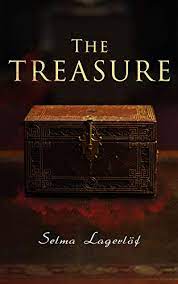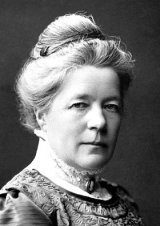The Treasure Page #17
The Treasure is a 1904 novel by the Swedish writer Selma Lagerlof. Its original Swedish title is Herr Arnes penningar, which means "Mr. Arne's money". It has also been published in English as Herr Arne's Hoard. Set in Bohuslän in the 16th century, it tells the story of a group of Scottish mercenaries who escape from prison; they go on to murder a family to steal a treasure chest, after which one of them falls in love with the family's sole survivor.
It was no quiet night. There was a muffled rustling in the air, as the snow came whizzing past; there was a patter and splash as the rain came pelting down. And in the ice one crack after another opened with a noise like thunder, as though ships of war had been at sea exchanging heavy salvoes. But to none of this was the skipper listening. He stayed up the whole night, until a gray dawn spread over the sky; but still he did not hear the sound he was waiting for. At last a singing, monotonous murmur was borne upon the night air, a rocking, caressing sound as of distant music. Then the skipper hurried across the rowers' thwarts amidships to the lofty forecastle where his crew slept. "Turn out," he called to them, "and take your oars and boat-hooks! The time is almost come when we shall be free. I hear the roar of open water. I hear the song of the free waves." The men left sleeping and came out at once. They posted themselves along the ship's sides, while the day slowly dawned. When at last it was light enough for them to see what changes the night had brought, they found that all the creeks and channels were open far out to sea, but in the bay where they were frozen in not a fissure could be seen in the ice, which lay firm and unbroken. And in the channel which led out of this bay the ice had piled itself up into a high wall. The waves in their free play outside continually cast up floating ice upon it. In the sound between the skerries there was a swarm of sails. All the fishing-boats which had lain icebound off Marstrand were now streaming out. The sea ran high and blocks of ice still floated among the waves, but the fishermen seemed to think they had no time to wait for safe and calm water, and they had set sail. They stood in the bows of their boats and kept a sharp lookout. Small blocks of ice they fended off with an oar, but when the big ones came they put the helm over and bore away. On the high poop of the gallias the skipper stood and watched them. He could see that they had their troubles, but he saw too that one boat after another wriggled through and came out into the open sea. And when the skipper saw the sails gliding over the blue water, he felt his disappointment so bitterly that tears came into his eyes. But his ship lay still, and before him the wall of ice was piling up higher and higher. The sea outside bore not only ships and boats, but sometimes small white icebergs came floating past. They were big ice-floes that had been thrown one upon another and were now sailing southward. They shone like silver in the morning sun, and now and then they showed as pink as though they had been strewed with roses. But high up among the whistling of the wind loud cries were heard, now like singing voices, now like pealing trumpets. There was a sound of jubilation in these cries, swelling the heart of him who heard them. They came from a long flight of swans on their way from the south. But when the skipper saw the icebergs moving southward and the swans flying to the north such longing seized him that he wrung his hands. "Woe's me, that I must lie here!" he said. "Will the ice never break up in this bay? I may lie waiting here many days yet." Just as he said this, he saw a man come driving on the ice. He came out of a narrow channel on the Marstrand side, and he drove as calmly on the ice as if he did not know the waves had begun once more to carry ships and boats. As he drove under the stern of the gallias he hailed the skipper: "Ho, you there, frozen in the ice, do you lack food aboard? Will you buy my salt herring or dried ling or smoked eel?" The skipper did not trouble to answer him. He only shook his fist at him and swore. Then the fish hawker stepped off his load. He took a bunch of hay from the sledge and laid it in front of his horse. Then he climbed up on the deck of the gallias. When he faced the skipper he said to him very earnestly: "Today I have not come to sell fish. But I know that you are a God-fearing man. Therefore I have come to ask your help to find a maiden whom the Scotsmen brought out to your ship with them yester-night." "I know naught of their bringing any maiden with them," said the skipper. "I have heard no woman's voice aboard the ship tonight." "I am Torarin the fish hawker," said the other; "maybe you have heard of me? It was I who supped with Herr Arne at Solberga parsonage the same night he was murdered. Since then I have had Herr Arne's foster daughter under my roof, but last night she was stolen away by his murderers, and they have surely brought her with them to your vessel." "Are Herr Arne's murderers aboard my vessel?" asked the skipper in dismay. "You see that I am a poor and feeble man," said Torarin. "I have a palsied arm, and therefore I am fearful of taking upon myself any bold and hazardous thing. I have known these many days who were Herr Arne's murderers, but I have not dared to bring them to justice. And because I have held my peace they have made their escape and have found occasion to carry the maiden with them. But now I have said to myself that I will have no more of my conscience in this matter. At least I will try to save the little maid." "If Herr Arne's murderers are on board my ship, why does not the watch come out and arrest them?" "I have begged and prayed them all this night and morning," said Torarin, "but the watch durst not come out. They say there are a hundred men-at-arms on board, and with them they durst not contend. Then I thought, in God's name I must come out here alone and beg you help me to find the maiden, for I know you to be a God-fearing man." But the skipper paid no heed to his question of the maiden; his mind was full of the other matter. "What makes you sure that the murderers are on board?" he said. Torarin pointed to a great oaken chest which stood between the rowers' thwarts. "I have seen that chest too often in Herr Arne's house to be mistaken," he said. "In it is Herr Arne's money, and where his money is, there you will find his murderers." "That chest belongs to Sir Archie and his two friends, Sir Reginald and Sir Philip," said the skipper. "Ay," said Torarin, looking at him fixedly; "that is so. It belongs to Sir Archie and Sir Philip and Sir Reginald." The skipper stood silent awhile and looked this way and that. "When think you the ice will break up in this bay?" he said to Torarin. "There is something strange in it this year," said Torarin. "In this bay we have always seen the ice break up early, for there is a strong current. But as it shapes now you must have a care that you be not thrust against the land when the ice begins to move." "I think of naught else," said the skipper. Again he stood silent for a while and turned his face toward the sea. The morning sun shone high in the sky, and the waves reflected its radiance. The liberated vessels scudded this way and that, and the sea birds came flying from the south with joyous cries. The fish lay near the surface and glittered in the sun as they leapt high out of the water, wanton after their long imprisonment under the ice. The gulls, which had been circling out beyond the edge of the ice, came in great flocks toward land to fish in their old waters.
Translation
Translate and read this book in other languages:
Select another language:
- - Select -
- 简体中文 (Chinese - Simplified)
- 繁體中文 (Chinese - Traditional)
- Español (Spanish)
- Esperanto (Esperanto)
- 日本語 (Japanese)
- Português (Portuguese)
- Deutsch (German)
- العربية (Arabic)
- Français (French)
- Русский (Russian)
- ಕನ್ನಡ (Kannada)
- 한국어 (Korean)
- עברית (Hebrew)
- Gaeilge (Irish)
- Українська (Ukrainian)
- اردو (Urdu)
- Magyar (Hungarian)
- मानक हिन्दी (Hindi)
- Indonesia (Indonesian)
- Italiano (Italian)
- தமிழ் (Tamil)
- Türkçe (Turkish)
- తెలుగు (Telugu)
- ภาษาไทย (Thai)
- Tiếng Việt (Vietnamese)
- Čeština (Czech)
- Polski (Polish)
- Bahasa Indonesia (Indonesian)
- Românește (Romanian)
- Nederlands (Dutch)
- Ελληνικά (Greek)
- Latinum (Latin)
- Svenska (Swedish)
- Dansk (Danish)
- Suomi (Finnish)
- فارسی (Persian)
- ייִדיש (Yiddish)
- հայերեն (Armenian)
- Norsk (Norwegian)
- English (English)
Citation
Use the citation below to add this book to your bibliography:
Style:MLAChicagoAPA
"The Treasure Books." Literature.com. STANDS4 LLC, 2025. Web. 5 Feb. 2025. <https://www.literature.com/book/the_treasure_6>.








Discuss this The Treasure book with the community:
Report Comment
We're doing our best to make sure our content is useful, accurate and safe.
If by any chance you spot an inappropriate comment while navigating through our website please use this form to let us know, and we'll take care of it shortly.
Attachment
You need to be logged in to favorite.
Log In